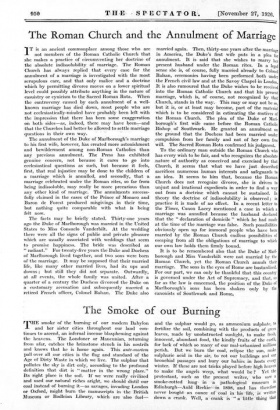The Roman Church and the Annulment of Marriage
IT is an ancient commonplace among those who are not members of the Roman Catholic Church that she makes a practice of circumventing her doctrine of the absolute indissolubility of marriage. The Roman Church has always replied that every case for the annulment of a marriage is investigated with the most scrupulous care, and that only malice and a doctrine which by permitting divorce moves on a lower spiritual level could possibly attribute anything in the nature of casuistry or cynicism to the Sacred Roman Rota. When the controversy caused by each- annulment of a well- known marriage has died down, most people who are not ecclesiastically-minded have probably been left with the impression that there has been some exaggeration on both sides—as, indeed, there may have been-and that the Churches had better be allowed to settle marriage questions in their own way.
The annulment of the Duke of Marlborough's marriage to his first wife, however, has created more astonishment and bewilderment among non-Roman Catholics than any previous annulment. The Press has exhibited genuine concern, not because it cares to go into ecclesiastical questions as such, but because it feels, first, that real injustice may be done to the children of a marriage which is annulled, and secondly, that a marriage celebrated under the Roman rites, so far from being indissoluble, may really be more precarious than any other kind of marriage. The annulments success- fully claimed in the cases of the Prince of Monaco. and Baron de. Forest produced misgivings in their time, but nothing quite comparable with what is being felt now.
The facts may be briefly stated. Thirty-one years ago the Duke of Marlborough was married in the United States to Miss Consuelo Vanderbilt.. At the wedding there were all the signs of public and private pleasure which are usually associated with weddings that seem to promise happiness. The bride was described as " radiant." For twenty-five years the Duke and Duchess of Marlborough lived together, and two sons were born of the marriage. It may be supposed that their married life, like many other married lives, had its ups and downs ; but still they did not separate. Outwardly, at all events, the whole family was united. After a quarter of a century the Duchess divorced the Duke on a customary accusation and subsequently married a retired French officer, Colonel Balsan. The Duke also married again. Then, thirty-one years after the marriage in America, the Duke's first wife puts in a plea for annulment. It is said that she wishes to marry her present husband under the Roman rites. In a legal sense she is, of course, fully married already to Colonel Balsan, ceremonies having been performed .both under the French civil law and at the Savoy Chapel- in. London. It is also rumoured that the Duke wishes to be received into the Roman Catholic Church and -that his present marriage, which is, of course, not recognized by that .Church, stands in the way.. This may or may not be so, but it is, or at least may become, part of the material which is to be considered in estimating the -motives of the Roman Church. The plea of the Duke of Marl. borough's first wife came before the Roman Catholic Bishop of Southwark. He granted an annulment on the ground that the Duchess had been married under .compulsion from her family and not of her own free will. The Sacred Roman.Rota confirmed his judgment.
To the ordinary man outside the. Roman Church who has every wish to be fair, and who recognizes the absolute .nature of authority as conceived and exercised by that Church, it seems that what we have just . described sacrifices numerous human interests and safeguards to an idea. It seems to him that, because the Roman Church does not recognize divorce, she is driven to unjust and irrational expedients in order to find a way out from a doctrine which cannot be sustained. In theory the doctrine of indissolubility is observed ; in practice it is made of no effect. In a recent letter to the Times, Canon Lacey mentioned a case in which a marriage was annulled because the husband declared that the " declaration of domicile " which he had made at the time of the marriage was false.. Such possibilities obviously open up for immoral people who have been married by the Roman Church endless possibilities of escaping from all the obligations of marriage to which our own law holds them firmly bound.
It is to be remembered also that the Duke of Marl. borough and Miss Vanderbilt were not married by the Roman Church, yet the Roman Church annuls their marriage. The sons in the eyes of Rome are bastardized. For our part, we can only be thankful that this country is governed under the Act of Supremacy, and that, so far as the law is concerned, the position of the Dukc of Marlborough's sons has been shaken only by the canonists of Southwark and Rome,


















































 Previous page
Previous page